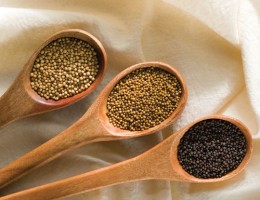![]()

Mustard has been used as a preservative for centuries. It's essential oils inhibit the growth of certain yeasts, molds, and bacteria. Both horseradish and mustard oil pack a punch against Listeria, E-coli, Staphylococcus, Aureus and other food pathogens you don’t want on your dinner plate. This is because of a chemical called Allyl Isothiocyanate, of which mustard oil has 93% and horseradish has 60%.
- Mustard has a natural antioxidant, D-alpha Tocapherol or Vitamin E. This natural protection affords mustard a long shelf life.
- Mustard is composed mainly of protein and oil, whole seed is 30-35% fixed oil; 25-30% protein; 6-9% crude fibre.
- Mustard is an emulsifier, stabilizes oil in water (prevents separation), and is used in such things as mayonnaise, salad dressings, and meat processing. It also minimizes the possibility of curdling when used in a hollandaise sauce.
- Approximately 90% of the world’s mustard is grown in Western Canada. Saskatchewan is “The Mustard Capital of the World”. For more information about Canadian mustard go to: http://www.saskmustard.ca/